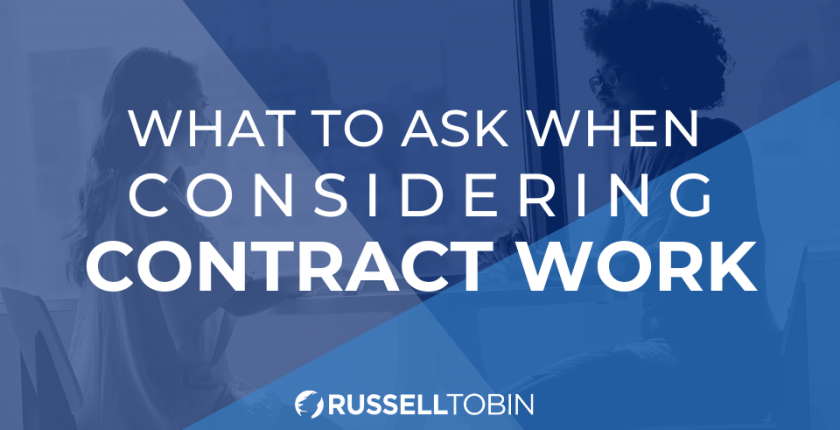In recent years, more and more companies are utilizing contract employees. In 2019, Google’s contract employees outnumbered its full-timers by nearly 20,000. And in 2018, NPR posted in article titled “Freelanced: The Rise Of The Contract Workforce” stating that “a new NPR/Marist poll finds that 1 in 5 jobs in America is held by a worker under contract.” They predict that freelancers and contractors will make up half of the American workforce within one decade!
Given this shift in the workforce (not just at Google, but also at many other Fortune 1000 organizations) you should really consider being open to—and get educated on—contract work.
So… what’s the difference between being a contractor and being a full-time employee? The main difference between a contract and direct-hire employment is that in most cases, the agency (i.e. Russell Tobin) would be your W2 employer. That means you would be on-site at the client every day supporting and working with your respective team. You would be gaining your experience through that company, and would put them on your resume, LinkedIn, etc. But, you would receive benefits (if applicable), payroll, and your W2 at the end of the year would have the agencies name on it.
I’ve spent much of my recruiting career working with recent graduates and/or first-time contractors filling many roles in industries that look for contractors on a regular basis. When speaking with these candidates, I always suggest the following questions when they’re ready to evaluate an agency and/or an open role.
People often describe contract work as a ‘foot in the door’ for your next role, but in reality, it’s allowing you to bring your whole self to the client/organization to show them what you’re made of—your talents, your experience, and your expertise. Take this time while contracting to soak in what these organizations have to offer you, as well: knowledge, support, and opportunity. Be open and get educated—contracting is worth considering.
- Would I be a W2 Employee at your agency while working onsite at the respective client?
- Does the agency provide benefits? Can I see the package to get an idea of what is provided?
- Why is the role open at the client? (i.e. open headcount, backfill, leave coverage, special project)
- Does this client have a tenure limit? (i.e. a maximum time you can contract for)
- Is there potential for this role to be extended or converted? What would the process look like if I were to convert to a full-time employee with the client at the end of my contract?
- What is the pay schedule? How am I paid? (i.e. direct deposit, mailed check) Would I be eligible for overtime?
- When I start, what does onboarding look like?

 Helping the
Helping the Specialized
Specialized Industrial
Industrial Healthcare
Healthcare MSP & Contingent
MSP & Contingent Innovative
Innovative Business
Business








